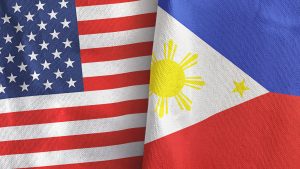The top foreign and defense officials of the United States and the Philippines will meet in Washington early next week, in the latest sign of the expanding security cooperation between the two allies.
In a statement yesterday, the U.S. Department of State announced that U.S. Secretary of State Antony Blinken and Secretary of Defense Lloyd Austin will receive Philippine Foreign Affairs Secretary Enrique Manalo and defense chief Carlito Galvez on April 11.
According to the State Department, Blinken and Austin “will reaffirm the United States’ ironclad commitment to our alliance with the Philippines, which has contributed to peace, stability, and prosperity in the Asia-Pacific region for more than 70 years.”
The Philippine Department of Foreign Affairs added that the officials will hold talks on “important global prosperity issues” such as energy, security, trade and economic cooperation. Talks will also cover “identifying concrete initiatives for promoting regional security, achieving mutual economic prosperity, modernizing the alliance, and countering terrorism and other transnational crimes.”
The meeting will also “enable the United States and the Philippines to deepen our bilateral security and economic partnership and strengthen our close collaboration on advancing a free and open, connected, prosperous, secure, and resilient Indo-Pacific region.”
This so-called 2+2 meeting between the U.S. and Philippine defense and foreign ministers was first held in April 2012, an event that the two sides described as “a testament to our shared commitment to write a new chapter in the partnership between our two countries.” The meeting came at a time of particular tension in the South China Sea, falling in the midst of the standoff between China and the Philippines over the Scarborough Shoal, which precipitated a sharp drop-off in relations between the two countries.
However, the 2+2 meeting has not taken place since January 2016, not coincidentally the same year that saw the election of President Rodrigo Duterte. Upon taking office that July, Duterte initiated a swift pivot away from the United States and turned a new page in relations with China, despite Beijing’s continuing assertive actions in disputed parts of the South China Sea.
The reconvening of the 2+2 ministerial meeting, therefore, is a symbol of the recent breakneck progress in the U.S.-Philippine alliance, which, since President Ferdinand Marcos Jr. took office last year, has not only made up the lost ground of the Duterte years, but in quick order exceeded it. Last week, the Philippines announced the location of four additional military facilities that will host a rotational U.S. troop presence under the 2014 Enhanced Defense Cooperation Agreement (EDCA), on top of the five sites that were earmarked in 2016. EDCA grants the U.S. military the right to base personnel temporarily at select Philippine military bases, and to use facilities such as runways, fuel storage, and military housing.
The location of the sites was highly strategic, including three on the northern island of Luzon, close to the Taiwan Strait, and one on the southwestern tip of Palawan island, close to the disputed Spratly Islands in the South China Sea, where China and the Philippines have dueling maritime and territorial claims. The U.S. has also announced $82 million in infrastructure upgrades for the five original EDCA sites.
Next week’s 2+2 meeting will also coincide with the April 11 opening ceremony of this year’s Balikatan military exercises, which will see the participation of more than 17,600 U.S., Filipino, and Australian troops. It will be the largest ever iteration of the exercises.

































